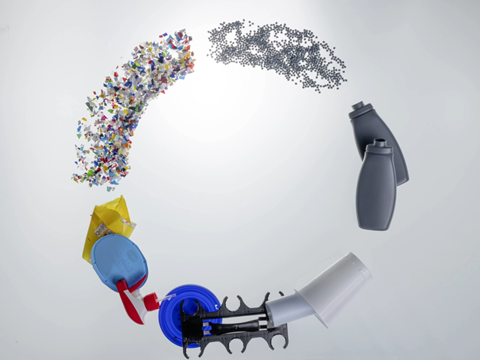
In this edition of our ‘In Conversation With…’ series, Laura Ott, head of Customer Development at PreZero Sustainable Packaging, explains how digitalization and standardization can help businesses keep on top of evolving legislation – and how PreZero can help.
In your experience, what challenges do companies face with regulatory compliance in the packaging sector?

Laura Ott, head of Customer Development at PreZero Sustainable Packaging
“Too much, too soon, too new.” That’s how many businesses would describe the current regulatory climate. The Packaging and Packaging Waste Regulation (PPWR) is the most comprehensive overhaul of EU packaging law to date—but it’s only one piece of the puzzle.
Companies are also grappling with the EmpCo Directive, national plastic taxes, eco-modulation schemes, littering fees, and even the Deforestation Regulation. The pace and volume of change are overwhelming, especially for organisations without specialist resources.
The PPWR alone will require entirely new declarations of conformity and technical documentation for all packaging by mid-2026. But perhaps the biggest challenge is that compliance can’t be siloed.
It’s no longer a task for just the packaging or legal teams. Product management, marketing, and even corporate strategy are directly impacted—requiring cross-functional coordination that many businesses aren’t yet set up for.
So it’s not just a legal or technical challenge—it’s an organizational one?
Exactly. These regulations go to the core of how products are designed, labelled, marketed, and even priced. Meeting them requires not only new technology, but new ways of working.
How can digitalization help to overcome these challenges?
Digital packaging data management is quickly becoming a necessity—not a nice-to-have. Take the PPWR: by mid-2026, companies must prove that their packaging is compliant with the regulation. By 2030 this includes being recyclable, minimized, free of substances of concern, and — if plastic — containing a specific share of recycled content.
But it’s not enough to simply meet these criteria. You have to report on them fastidiously, in a declaration of conformity backed by technical documentation.
And that’s where it gets complex. Let’s say you manufacture shampoo in a plastic bottle. To assess recyclability, you need data from the bottle supplier, the label manufacturer, the cap producer, and then aggregate those inputs into a single, compliant packaging unit. Compliance isn’t assessed per component, but for complete packaging system.
Managing this with PDFs and spreadsheets may work for one SKU. But even a modest product portfolio quickly turns that process into a version-control nightmare. For SMEs and multinationals alike, digital tools are the only scalable solution.

With all these changes on the horizon, what practical steps should companies take now to get ready?
First, take stock of what you already have. Many companies assume they have more packaging data than they actually do.
A structured gap analysis is the essential starting point: How much of the information required for recyclability assessments or other aspects of a declaration of conformity is already available? And how much is missing, outdated, or siloed?
The next step is to put the right software in place. Without a centralized system to manage packaging specifications, it becomes nearly impossible to track key metrics, generate compliance documentation, or support broader sustainability reporting in a reliable way.
Finally, it’s about integration. Your packaging data system shouldn’t be a standalone tool. It needs to connect to your ERP, your PIM, and—critically—your supplier workflows.
Our best-practice recommendation is to make packaging data part of your standard business exchanges: whenever you send or receive goods, the relevant packaging specifications and compliance data should be attached by default. That’s the level of readiness the new regulatory environment demands.
PreZero is known primarily as a European waste and recycling company. What role do you play in helping businesses prepare for regulatory change?
We’re far more than a recycling company—we see ourselves as a circular economy enabler. Many of our innovations have grown directly out of the needs of our parent organization, the Schwarz Group.
For example, we’ve established one of Germany’s leading packaging recovery schemes, now the second largest in the country. We’ve helped transform waste streams from a cost factor into a value driver, and we’ve built scalable systems for reusable transport packaging, such as pooled pallets.
Now, like everyone else in the industry, our retailers, Lidl and Kaufland, need to get their packaging portfolios ready for PPWR. That’s why we’ve partnered with leading specialists and developed a comprehensive service offering for packaging compliance and sustainability—one we’re now making available to the wider market.
What sets us apart is our operational perspective. We’re not a classic consultancy. We come from hands-on experience. We operate some of the most advanced sorting and recycling plants in Europe. When we talk about recyclability, we’re not speaking theoretically—we’re speaking from the reality of what happens on sorting lines and recycling processes.
You’ve outlined the challenges and the strategic response. How exactly can PreZero support companies on the path to compliance?
It all starts with digitalization. That’s why we launched PreZero SPOT—a software solution developed in partnership with Packaging Cockpit and their parent company Circular Analytics, renowned for their expertise in the environmental assessment and optimization of packaging.
SPOT is a digital platform for packaging specification management, optimization, and conformity checks. In short: it delivers exactly what’s needed to prepare for regulations like the PPWR.
And we’ve made it easy to try. Companies can explore SPOT free of charge at spot.prezero.com and see for themselves how it can support their packaging workflows.
But SPOT is only the beginning. Our broader offering is designed to take companies all the way to full compliance—and beyond. We call it the SPEAR framework:
- S – Study: Our experts help you interpret the PPWR and related legislation in the context of your actual packaging portfolio—cutting through the complexity and clarifying how exemptions and thresholds apply.
- P – Prepare: We analyze your current packaging portfolio and map it against upcoming regulatory requirements—identifying where you’re already on track and where adjustments are needed. This isn’t just about highlighting problems; it’s about creating a clear, prioritized plan of action that reflects your business reality and timelines.
- E – Enhance: Our packaging engineers work with your team to define optimal solutions—balancing compliance, cost, sustainability, and consumer expectations.
- A – Act: We support implementation through supplier scouting, solution validation, and even hands-on project management where needed.
- R – Report: We help you track your progress and communicate it effectively—advising on claims, marketing messages, and reporting KPIs that resonate with customers.
And if you prefer to manage most of this internally? Even better. We’re here to support where it counts—without pushing unnecessary consulting or generic solutions. It’s about enabling your teams, not replacing them.
To learn more about the PreZero SPOT platform, click here.













